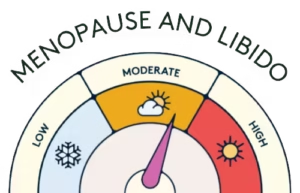Sexual health is an essential part of overall well-being, yet it often becomes a quiet concern during perimenopause and menopause. As hormone levels fluctuate and the body undergoes physical and emotional changes, it’s common for libido to shift—sometimes in unexpected ways.
This phase of life doesn’t signal the end of intimacy or desire. With the right information and support, many women find it’s actually the beginning of a deeper, more empowered connection with themselves and their partners.
What May Happen to Libido During Perimenopause and Menopause?
Perimenopause—the transitional period leading up to menopause—can begin as early as the mid-30s and may last years. During this time, levels of estrogen, progesterone, and testosterone fluctuate, which can directly impact sexual desire.

Some of the most common libido-related changes include:
- Decreased Sexual Desire: Lower testosterone can reduce overall interest in sex, while declining estrogen may affect arousal and lubrication.
- Vaginal Dryness and Discomfort: Thinner vaginal tissues and less natural moisture can make intimacy uncomfortable or even painful.
- Mood and Energy Shifts: Hormonal changes can bring on anxiety, low mood, irritability, or fatigue—all of which can impact desire.
- Sleep Disruptions: Hot flashes and night sweats may interfere with rest, leaving less energy for intimacy.
It’s important to note that not all women experience a drop in libido. Some feel more relaxed, less pressured by work or family demands, and more in tune with their bodies—leading to a renewed or even increased interest in sex.
Common Symptoms That Can Impact Sexual Health
While desire plays a central role in intimacy, other symptoms tied to perimenopause and menopause can influence how women experience their sexuality:
- Hot flashes & night sweats: These can interfere with sleep and lower energy levels.
- Weight changes & body image concerns: Shifting body composition or self-esteem issues may affect confidence and willingness to engage in intimacy.
- Decreased pelvic tone: Muscular changes in the pelvic region may reduce sensitivity or satisfaction during intercourse.
Practical Ways to Support Libido
Sexuality during midlife is influenced by a blend of hormonal, emotional, and lifestyle factors. The good news? There are many tools and strategies that can help support and reignite libido.
1. Hormonal Support
Hormonal changes are often at the root of libido shifts. Hormone therapy—particularly estrogen and/or testosterone—can help relieve symptoms such as vaginal dryness, low desire, and mood fluctuations. Topical vaginal estrogen is especially effective for addressing local discomfort without impacting the entire body.
2. Non-Hormonal Solutions
- Lubricants and moisturizers can alleviate dryness and improve comfort during intimacy.
- Vaginal laser treatments or pelvic floor therapy may also enhance sensitivity and tissue health.
3. Nourishing Your Body
- Exercise boosts circulation, energy, and body confidence.
- A balanced diet rich in zinc (pumpkin seeds), omega-3s (salmon, flax), and leafy greens can support hormone balance and reduce inflammation.
- Limiting alcohol and sugar can help regulate mood and energy.
4. Strengthening Emotional and Relational Intimacy
- Communication with a partner—about desires, discomforts, and preferences—can reduce anxiety and build deeper connections.
- Exploring different forms of intimacy, from touch and massage to non-sexual closeness, can keep the bond strong even if desire fluctuates.
- Counseling or sex therapy can help address emotional blocks, past trauma, or changing relationship dynamics.
5. Mind-Body Practices
- Mindfulness, yoga, and breathwork can help you feel more connected to your body and your senses.
- Practicing self-care and stress management can free up more mental and emotional space for desire.
A New Chapter of Sexuality
Libido during perimenopause and menopause doesn’t have to be something you “get through”—it can be something you rediscover. This stage offers the opportunity to reframe intimacy on your own terms. Whether that means trying new things with your partner, learning how to support your body through its changes, or simply tuning into what makes you feel good, there’s no “right” way to experience this part of life.
What matters most is staying curious, compassionate, and informed.
Need Expert Support?
For those looking to better understand or improve their sexual health during this time, expert support can make all the difference. At Bravella, our clinicians have extensive experience in women’s sexual health and in pelvic floor issues.
Whether you’re just beginning your perimenopausal journey or well into menopause, you’re not alone—and support is here when you need it.




